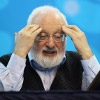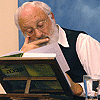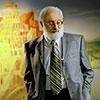Audio Version Of The Blog – 05.31.17
Listen to an Audio Version of the Blog
Download: MP3 Audio

Listen to an Audio Version of the Blog
Download: MP3 Audio
In my regular column in Haaretz, my new article: “What Our Ancestors Knew That We Don’t, and Why This Is Important Especially Today”
Precisely 50 days after their exodus from Egypt, the people of Israel achieved the level of complete unity and became “as one man with one heart.” In consequence, they received the Torah. Since then, no enemy has ever defeated the Jews except for their hatred for each other. Today, we have no unity and we have no idea what the Torah really is. Shavuot, the festival of the giving of the Torah, is a great opportunity to relearn this vital information, which today can save our lives and restore our nationhood.
To understand the power of our unity, which granted us the Torah, think of our ancient past. The Hebrews conquered Canaan and turned it into the Land of Israel, but then lost due to their disunity and bloodshed. The book Kli Yakar (Commentary on Genesis 26:19), for example, describes “the hatred during the First Temple.” One of the key reasons for the ruin of the First Temple was bloodshed. Clearly, a nation whose members are killing one another is not a role model of unity.
Israel regained sovereignty in the Land of Israel after they united in the Babylonian exile in order to thwart Haman’s intention to execute them. Alas, after building the Second Temple, the Jews fell into internal bickering once more. In the first major instance of internal hostilities, Hellenized Jews fought against the Maccabees and lost. In the second instance, the hatred of Jews for each other became so widespread and intense that the general of the Roman Empire in the Land of Israel, Tiberius Julius Alexander—a Jew whose own father had coated the Temple’s gates with gold—destroyed the Second Temple and set off the final Jewish exile from the Land of Israel.
The Biggest Misconception about the Torah
Throughout the generations, the difference between bane and boon has been determined by our disunity and unity. The driving force that allows us to unite above the bickering, hatred, slander, and ill-will is called “Torah,” from the Hebrew word “ohr” (light). The book Mesilat Yesharim (Chapter 5) writes, “This is the meaning of what our sages said (Midrash Rabbah, Eicha, Preface), ‘I wish they left Me but kept My law (Torah),’ for the light in it reforms it (the evil inclination).” Likewise, the book Maor Eynaim (Parashat Tzav) writes: “With the Torah, a person can struggle with the evil inclination and subdue it because the light in it reforms it.”
The Babylonian Talmud (Kiddushin 30b) writes that the Creator said, “My sons, I have created the evil inclination, and I have created for it the Torah as a spice.” Similarly, the book Metzudat David (Commentary on Jeremiah, 9:12) explains that Israel lost their land because they fell into the evil inclination once they stopped engaging in the Torah because “the light in it reforms it.” To be clear about the meaning of “evil inclination,” the Holy Shlah writes in the book In Ten Utterances (“Utterance no. 6”), “The most evil qualities are envy, hatred, greed, and lust, which are the qualities of the evil inclination,” precisely what constitutes our ego.
The Torah, therefore, is not a book. The Torah is a depiction of two contradicting forces—positive and negative, giving and receiving, creation and destruction—whose interactions build and guide our universe. These forces operate in perfect harmony and unity between them and thereby create the universe we live in. When we create the same harmony and unity among us, that force influences us and changes our nature, making us equally harmonious and united. This is why the people of Israel received the Torah only after they united “as one man with one heart” and created that harmony and unity among them. This is also why as long as Israel kept their unity, they had the Torah and were kept safe from harm.
The Talmud writes, “As light protects forever, so Torah protects forever” (Masechet Sotah 21a). The Midrash (Mishley, Portion 2) also states, “The Torah protects one who engages in it.”
When we think of engaging in the Torah, we normally think of delving into the verses and commentaries in the book. This is the biggest misconception about the Torah. In truth, engaging in Torah means strengthening our unity, just as the people of Israel did at the foot of Mt. Sinai. This is why the book Maor Vashemesh (Parashat Yitro) writes, “Obtainment of the Torah is primarily through unity, as in the verse, ‘And Israel encamped there before the mount,’ ‘as one man with one heart,’ and there their filth (evil inclination) ceased.” In Parashat Emor, the book continues, “During the days of the [omer] count, a person should correct the quality of unity, and by this one is rewarded with obtainment of the Torah on the festival of Shavuot, as it is written, ‘And they journeyed from Rephidim and came to the Sinai desert, and Israel encamped there before the mount.’ RASHI interpreted that they were all in one heart as one man and this is why they were rewarded with the Torah.”
The Language of Roots and Branches
When we read in the Torah, the stories in it seem as though they are referring to flesh and blood characters. Perhaps these characters existed in reality, but this is not what the Torah conveys to us. The Torah was given to the people of Israel who lived 3,000 years ago. To them, it was perfectly clear that the Torah speaks of internal forces and how they interact rather than of physical events. However, to understand the Torah correctly, we need to be in the same state as the people of Israel when they received the Torah: united as one man with one heart.
Over time, we have grown increasingly farther from unity. In the end, we sank into unfounded hatred and thereby lost our ability to understand what is written in the Torah. To reconnect us to the reforming light, which is the Torah, new texts needed to be written. These would derive from the Torah, but would be intended to help the people of Israel regain their unity and in this way restore their understanding of the Torah. Rabbi Akiva, who lived toward the end of Israel’s connection with the real Torah, said, “Love your neighbor as yourself is the great rule of the Torah” (Jerusalem Talmud, Nedarim, Chapter 9, p 30b). His disciple, Rabbi Shimon Bar Yochai (Rashbi) wrote The Book of Zohar, which states that it is a commentary on the Torah (Pentateuch). Rashbi’s disciple, Rabbi Yehuda Hanasi, was the redactor of another detailed commentary on the Torah—the Mishnah.
Later, as people grew even farther from unity and from the perception of the forces that the Torah describes, even the Mishnah required explanations. These explanations were collected in what we called Gemarah or Talmud. Nevertheless, none of these texts speaks of physical events. They describe only the inner forces that make up reality, and the physical depictions in them are mere instruments to reflect what happens on the deeper level.
Rav Yehuda Ashlag, author of the most elaborate commentary on The Book of Zohar since its creation, describes this mode of writing as “the language of roots and branches.” The branches, which are events in our world, describe what is happening at the roots—the realm of forces. In his essay “The Essence of the Wisdom of Kabbalah,” Rav Ashlag writes that our sages “have found a set and annotated vocabulary, sufficient to create an excellent spoken language. It enables them to converse with one another of the dealings in the roots by merely mentioning the tangible branch, which is well defined to our corporeal senses.”
Reestablishing Our Nationhood
Approximately 2,000 years ago, when we fell into unfounded hatred and began to hate each other for no apparent reason, separation and alienation took such a hold on us that they completely detached us from the profound perception of reality by which our ancestors lived. Our ancestors received the Torah, namely the profound and comprehensive understanding of reality, through their efforts to unite. Now, in our baffling times, we must do the same. The book Avnei Miluim (Introduction) writes, “This is what our sages meant when they said, ‘And Israel encamped there before the mount,’ all of them ‘as one man with one heart.’ They wish to say that the entire nation united into one man, after which the Giver was compelled to give them the Torah.”
Without unity, we are not a nation, but a collective whose components despise and deride one another. If we want to reestablish our nationhood, and with it our ancient strength, we must first unite and reconnect with the (real) Torah, just like our ancestors.
In Search of a Role Model
When we received the Torah, the light, we were also commanded to be “a light unto nations,” to spread that light to the rest of the world. Our nation was not created for its own sake, but in order to serve as an example that shows the benefits of unity. As long as we are as hateful of each other as we are today, we are defying our vocation and in the process, denying the world the chance to unite and the understanding of reality that is so vital to our survival in this era of bewilderment.
Had we accepted that our role is to unite and thereby spread to the world the light called Torah, we would have spared ourselves the vast majority of the suffering our nation has experienced since the ruin of the Second Temple. In 1929, Dr. Kurt Fleischer, leader of the Liberals in the Berlin Jewish Community Assembly, argued that “Anti-Semitism is the scourge that God has sent us in order to lead us together and weld us together.” Yet, not only did German Jewry not listen to the call to unity, some even supported anti-Semitism. The Association of German National Jews, for example, supported and voted for Hitler and the Nazi party.
The nations seek our example, but we refuse to give it. Henry Ford, the most prominent proponent of anti-Semitism in America, wrote in his infamous book, The International Jew—the World’s Foremost Problem: “Modern reformers, who are constructing model social systems, would do well to look into the social system under which the early Jews were organized.” Later in the book, Ford added, “Society has a large claim against the Jew … that he begin to fulfill … the ancient prophecy that through him all the nations of the earth should be blessed.” Clearly, as long as we are disunited, the earth cannot be blessed through us.
Our world is changing. Globalization and the internet have irreversibly connected us. But in order to benefit from our connection, we must learn how to do so in a manner that benefits everyone, and not only the exploitative, ruling elite. Such connections are against our nature, but if we exert to unite despite ourselves, we will discover what our ancestors discovered in the Sinai Desert.
This time of the year, when Shavuot, the festival of the giving of the Torah, is right around the corner, let us remember that the true meaning of the Torah is love of others, and let us unite in order to disclose this to ourselves, to the entire world, and thereby be “a light unto nations.”
[207600]
 Question: Where is the Creator felt: in the mind, in thoughts, in feelings, or in desires?
Question: Where is the Creator felt: in the mind, in thoughts, in feelings, or in desires?
Answer: It is in the feelings.
Question: Where is the point where I feel that I exist? Is this point also a thought?
Answer: No. Thought is on a much lower level than sensation. Feeling is the innermost point that characterizes a particular desire. The desire to rise above my self and connect with the Creator brings a person to the fact that he begins to feel the Creator’s thought of creation in relation to himself and he connects with Him.
[205867]
From the Kabbalah Lesson in Russian 1/15/17
Related Material:
Thoughts And Mind
Becoming A Part Of The Creator’s Thought
Attaining The Mind Of The Universe
 Question from Facebook: What is the connection between the wisdom of Kabbalah and the Torah? After all, Kabbalah is a science about the universe, its origin, general structure, its movement as a whole, and every detail in particular. How can such a grandiose teaching be based on religious stories and parables?
Question from Facebook: What is the connection between the wisdom of Kabbalah and the Torah? After all, Kabbalah is a science about the universe, its origin, general structure, its movement as a whole, and every detail in particular. How can such a grandiose teaching be based on religious stories and parables?
Answer: Indeed, there is no connection between Kabbalah and the ordinary worldly interpretation of the Torah. After all, in truth, Kabbalah is the hidden, secret part of the Torah because a person cannot reveal it through his own qualities.
But when it reveals itself, a person sees that the Torah changes his senses and leads him to the perception of the upper world—the system of governing our world in order to change a human and through him to change our world, and not just to perform some kind of material actions. This is what the Torah speaks about.
The Torah is divided into the internal part (Kabbalah) and the external part, which talks about the fulfillment of some accepted conventions and actions, which is called “practical Judaism.”
[206071]
From KabTV’s “News with Michael Laitman” 3/27/17
Related Material:
Torah And The Wisdom Of Kabbalah
What Came First, The Torah Or The Wisdom Of Kabbalah?
Don’t Play With Fire
 We need to understand what independence means for Israel because it is radically different from what independence is considered to be on other levels: inanimate, vegetative, animate, and even among other nations of the world.
We need to understand what independence means for Israel because it is radically different from what independence is considered to be on other levels: inanimate, vegetative, animate, and even among other nations of the world.
Ultimately, all of humanity must reach independence in the understanding of Israel because this group is carrying out the program of correction for the entire world, as if in the preliminary stage, as if in a laboratory.
Therefore, achieving independence for this group should be viewed as the future state of independence for the entire world. And today it is especially felt how much the world needs this. In order to understand what independence means, first we need to experience what it means to be a slave of our own desire for pleasure.
Little by little, people are becoming aware that our egoistic nature holds us in bondage and mercilessly uses us, preventing us from living or dying.
As pitiful battered creatures, we spend our entire lives simply trying to avoid suffering. Small joys are considered a happy life. That is why we need to understand that independence is primarily independence from our nature, our egoism.
This type of independence has levels. Instead of being under the control of egoism, we need to get under the control of a new power because it is impossible to be without any animating force with which we can control our lives. But we must choose this force ourselves, preferring it over all other possibilities.
So independence has a very broad and exalted meaning, including within itself all of reality. After all, independence is inherent only to the Creator, and if we really want to achieve independence, then we need to rise to His condition, His level, His nature.
This kind of independence is not simple to reach. After all, for this we need to not only cross over into the nature of bestowal, but also build it above our own egoistic nature.
That’s why, if we want to receive our independence, we must be ready for a ceaseless battle with our egoism until the very end of correction. We can only establish our independence in opposition to egoism because one stands opposite the other: independence against slavery.
No matter what state a person experiences, it must be felt as if one is exiting Egypt or standing before the exit. We need to approach this very seriously because if we want to grow spiritually, there will be serious battles ahead of us against the forces of separation, as our egoism is revealed.
These forces will constantly rise and wedge between us in various ways, attempting to create conflict between us. And over all these phenomena, we will need to unite.
Primarily, we need to understand that the only thing preventing our independence is slavery. This is why without first entering Egypt, it is impossible to attain freedom. This dilemma stands before the nation of Israel who will need to demonstrate to all humanity the example of attaining independence, unity, and correction. And after it, all nations will achieve the same.
Therefore, we are not celebrating Independence Day yet, but rather the opportunity to attain it!
[206120]
From the Lesson: “Independence Day,” 4/25/17
Related Material:
Independence Day: How To Be Independent
Independence Day: The Beginning Of The Redemption Of Humanity
Wanting To Be Independent